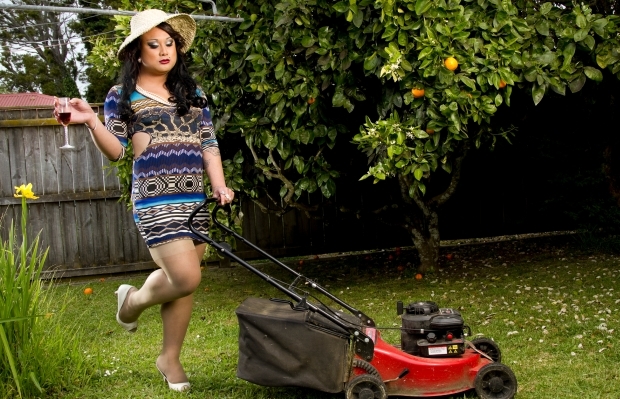
Visual artist Moe Laga puts a playful twist on gender expectations as part of the PolyTypical exhibition at Fresh Gallery Otara. Image courtesy of Moe Laga.
Daniela Maoate-Cox talks to a reverend, community workers, and contestants at a Pasifika gender-bending ball about how spirituality can co-exist with sexuality for Pacific people who identify as lesbian, gay, bisexual transgender, queer and intersex – or LGBTQI.
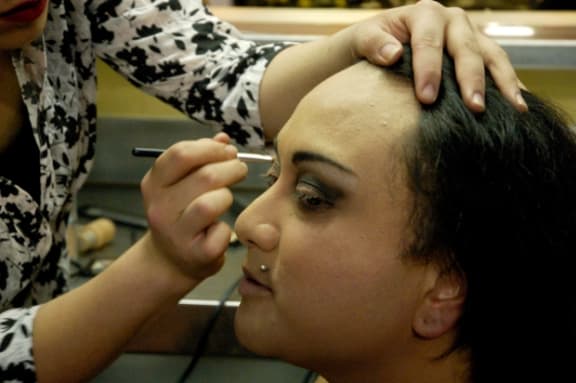
Moe Laga's makeup is done in Te Puke Otara community hall's kitchen. Photo: RNZ / Daniela Maoate-Cox
Normally Moe Laga would try to wake up early, spending at least an hour applying foundation to cover her beard and Adam’s apple. But for her role as a Fafswag Ball judge she enlisted the help of a makeup professional to ensure she looked her best.
Fafswag is a Polynesian take on the competitive ball culture from New York. Near Moe, a contestant for the PolyTypical category stands draped in metallic green. A belt and collar woven out of natural fibre acknowledge her Pacific heritage, while across the room, contenders for the Butch Queen category button up plaid shirts. People form and join houses to compete and this year, in South Auckland’s Otara, seven different houses of Pacific lesbian, gay, bisexual, transgender, queer and intersex (LGBTQI) people are bending the binaries of gender through costume, dance and attitude to impress the judges.
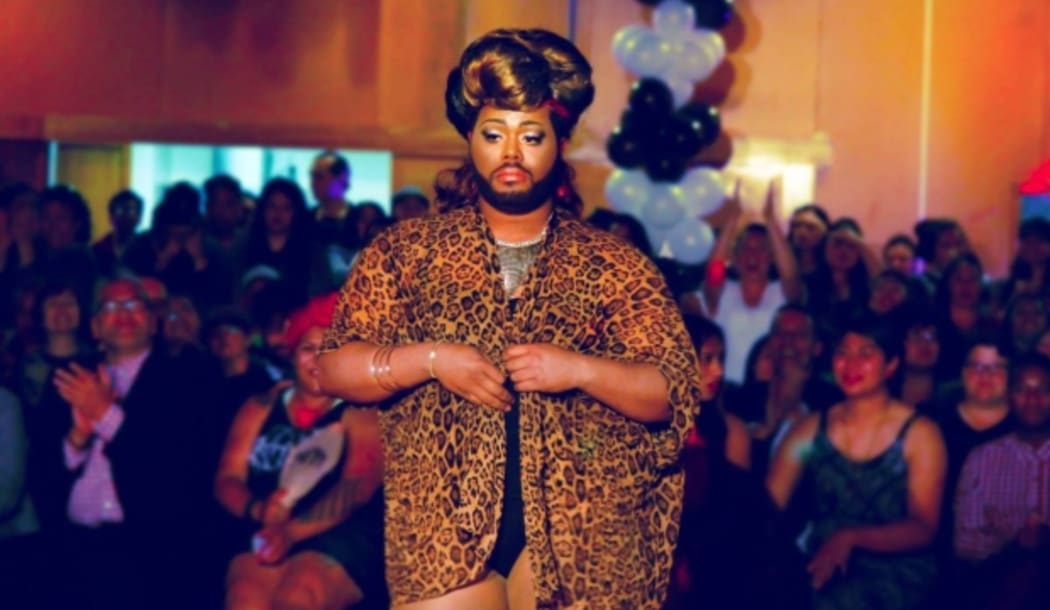
Fafswag ball contestant. Photo: Supplied
It’s a far cry from the popular portrayal of Pacific people in the media which often paints them as a conservative group sharing one opinion. In recent years the hot topic has been marriage equality and, as a predominantly religious group, Pacific people have been lumped together with the churches in opposition to the bill.
But not everyone agrees.
A couple of buildings over from the Fafswag ball is a Maori and Polynesian LGBTQI exhibition called PolyTypical which is curated by the ball’s organiser, Tanu Gago.
While the various photographs, videos and sculptures relate to the individual artists, Tanu says the glue that holds the exhibition together is the idea of being an orator for a new generation who don’t always agree with the stereotypes applied to Polynesian people.
For Tanu, the photographic work of Fafswag judge Moe Laga is an example of an individual’s story that speaks to a broader community.
“In this portrait series, she’s decided to talk about the masculine roles that are predominantly assigned to her as a person and how she prefers to do them,” he said. “She still has to mow the lawn and I’m sure if it was up to her she would prefer to do the lawn in that incredible dress and those pearls.”
Across the road from the exhibition is a Samoan Methodist Church but Tanu can’t imagine a situation where the two spaces, and the ideologies they represent, would clash.
“I love that the churches are around this space because that’s just real life,” he said. “Our young people are embedded in religious frameworks, it’s part of their culture and their identity and just because they identify this way doesn’t mean they’ve abandoned those values. It’s still very much a part of their life and I feel that’s reflected in the landscape, these two things coexist geographically the same way they do within our young people.”
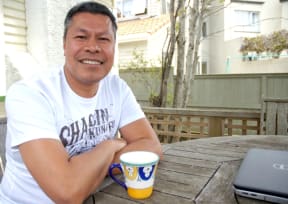
Reverend Uesifili Unasa supported the marriage ammendment bill and called for open debate among Pacific people around the issue. Photo RNZ Daniela Maoate-Cox.jpg Photo: RNZ / Daniela Maoate-Cox
Some of those young people have come across the path of the University of Auckland’s chaplain Uesifili Unasa who supported the marriage amendment bill. In the time he’s been a minister, Uesifili has affirmed both those that may be queer and those that reject all but heterosexuality. Uesifili doesn’t think his stance is radical.
“Nothing’s more natural in my view than our sexuality. Our Pacific people, when you give them the time of day, would be really comfortable to articulate the same things that I’m saying to you now. A lot of the views that we hear, the loudest voices that speak, tend to be more about the agenda of those who allow those voices and those views to be heard.”
Hanging out at the office on a Sunday is Usufonoimanū Peseta Betty Siō. She’s among those working to help Pacific people articulate their opinions through the anti violence organisation The Project. Betty does a lot of work with young people, particularly those identifying as LGBTQI.
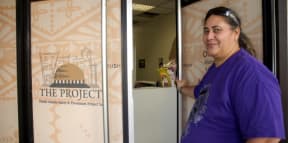
Betty Sio at The Project's office in Manukau. Photo: RNZ / Daniela Maoate-Cox
“During the marriage equality bill, some young people came out saying that they were being forced to sign a petition to say that they were against the bill and most of them decided not to sign it. They felt pressured, just from their own people, and within the churches.”
While Pacific people were seen speaking out against the bill, Betty says the opposition was a religious view and not specific to ethnicity or age.
“We get to have conversations, and it’s getting people to talk, to understand who they are in that space, whether you’re straight or LGBTQI, it shouldn’t matter. You should be able to have a conversation about who you are and be OK with it. That’s why we’re here.”
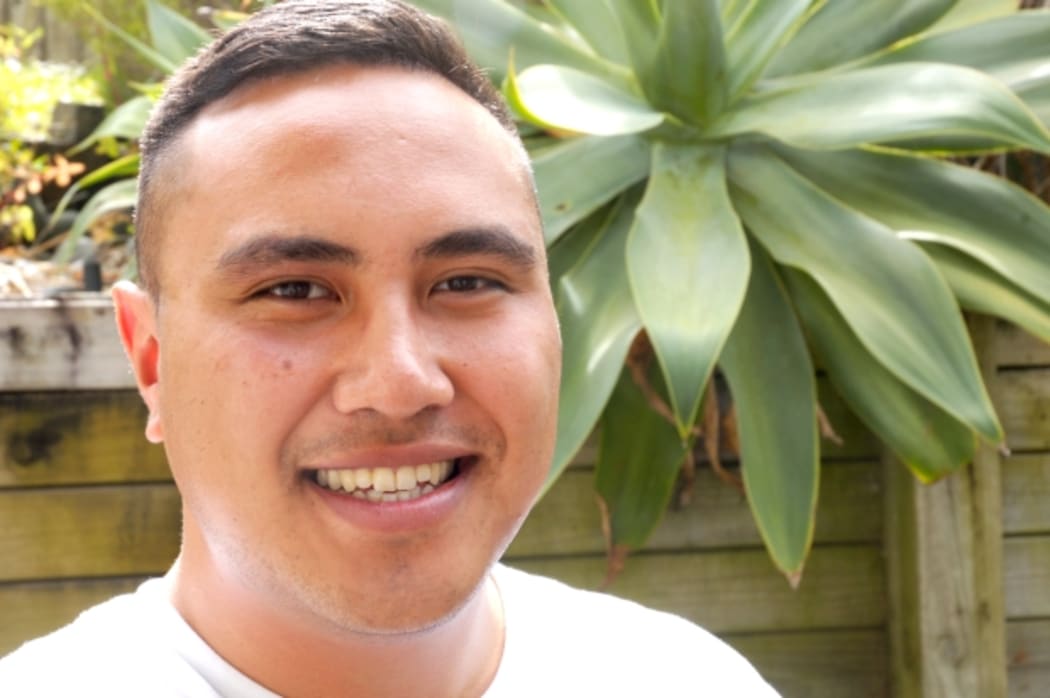
Tele'a Andrews once panicked that his sexuality couldn't coexist with his religion but says his faith pulled him through the shadows. Photo: RNZ / Daniela Maoate-Cox
One person who has taken that journey of self-discovery is Tele’a Andrews. A self-proclaimed product of the Catholic schooling system in Wellington, Tele’a once thought he would become a minister. But, at the age of 19, he moved to Auckland on a scholarship to study and once away from the distractions of family and religious obligations, Tele’a came out as gay.
“It was actually quite a rude awakening to me and I got very panicked and worried about what that meant for the rest of my life. When I looked at my life and the idea that I was going to enter a religious life I thought, how could the two coexist?”
Tele’a was on the verge of giving up his faith but a chance meeting with a Father from his hometown of Wellington changed his mind.
“He just told me a story about his cousin who came out as gay. He told me basically he still loves his cousin and his cousin is a huge part of his life and he said to me, which always lasted with me, that God calls everybody by name, and you can’t escape God’s call and whatever you do in life, you will be a minister to people. That’s why I’ve always believed in this walk, that my faith has pulled me out of the shadows.”
While church and faith go hand-in-hand a lot of the time, Tele’a believes people can still be filled with the holy spirit without sitting in a pew every Sunday.
“There are a lot of people out there with a deep seated faith in God and what they’re called to do. They might not be at church every Sunday but they’re out there living church. They’re the people holding hope for people who find it difficult to hold it themselves and if that’s not the church made manifest then I’m not too sure what is.”

